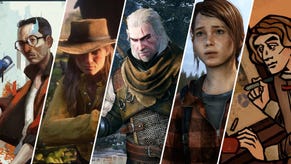Summer Eternal’s not-quite-Disco Elysium successor needs a focused vision, and the studio’s unique worker-owned set-up is the key to making sure it finds one
"I think we are going to relieve those fears."
One of the things that made Summer Eternal stand out from the not quite Disco Elysium successor studio crowd when it was announced was the unique way its developers - the majority of whom are ex-ZA/UM - had gone about setting up its structure.
Co-op was the word (or two contracted words jammed together) of the day, with Summer Eternal's structure seeing 50% and 25% of the company owned by co-ops for full-time and freelance workers respectively. 20% of it, meanwhile, will be held by an investor-funded LLC, and 5% has been set aside for a non-profit organisation that’ll be aimed at giving players of the studio’s games a chance to have some say in what the studio does.
How does all of that play into one of the biggest challenges when it comes to game development that aims to be extra collaborative? Well, in an interview which you can read the main bit of here, I asked the devs themselves how they might respond to potential criticism that the egalitarian focus of the studio's structure could make it tougher to deliver a tight, focused vision for their game, if there are differences in opinion among the various sections of Summer Eternal.
"Committees are compromise factories, unable by design to set artistic standards, in that compromises are the averages of everything and peaks and bottoms of nothing," responded Argo Tuulik, the last writer on the original Disco Elysium to depart ZA/UM, "'Artistically-driven, Creative-led, Worker- and Player-owned,' read the words of our (burning) house and we will make compromises everywhere except artistic vision.
"Creative decisions will always be made by a core team of artists, who once they agree on what it is they are going to make, choose one to take the responsibility and spearhead the project. A game director if you will. Ideally this is a role in-rotation, project by project. And while there’s little doubt our first one will be narrative-driven, it’s interesting to imagine a project led by visual and/or audio artists. Kenny Tartakovsky, 'Primal', 'Samurai Jack' – those types of explorations come to mind."
Former ZA/UM writer Dora Klindžić added that how Summer Eternal handles the "artistic project of creating a creative work" is something that the studio's team has been actively having internal conversations about, which are "often invoking that Bakunin quote: 'In the matter of boots, I defer to the authority of the bootmaker…'".
"Just because there are no capitalist bosses, that does not mean that the creative project will not have some structure of seniority, a division of decision-making power and a certain degree of project management and accountability," she continued, "The difference is that such structures should be propped up by the real things that matter in this world, which are skill, knowledge, experience, talent. Not imposed by money and perpetuated by fear of economic uncertainty."
Klindžić then used a quote about scientist Mitis from Ursula K. Le Guin’s novel The Dispossessed as an example of how the "social authority" held by Summer Eternal's leadership figures could look/function. It reads as follows: "There was always a kind of psychological clear space around Mitis, like the lack of clouds around the peak of a mountain. The absence of all enhancements and enforcements of authority left the real thing plain. There are people of inherent authority; some emperors actually have clothes."
Finally, she added: "I have seen some speculation on whether our strong and uncompromising political approach to organizing the studio is a sign that we will undertake our artistic project with less than our typical nuance and literary ambiguity. I think we are going to relieve those fears as we show more of our work, as the work of what makes a good story in fiction entails showing far more moral complexity, ambivalence, nuance and socio-political conflict than one necessarily wants to *be living* personally when they are writing the story."
Meanwhile, Aleksandar Gavrilović, the dev at Summer Eternal who penned its website's post outlining the studio's structure told me he's "not too worried". "Historically, and empirically, employee owned companies are better at strategy than their privately-owned counterparts," he said, "If [Basque federation of worker co-operatives] Mondragon with almost 100,000 employee-owners has no problem deciding on a focused vision, which enabled [it] to become one of the largest and most successful corporations in Spain, I don’t think our small artist collective will have much trouble."
For more from my chat with Summer Eternal, make sure to check out what the devs told me about their approach to the expectations involved in following on from their work on Disco Elysium and how they currently view the chances of things getting better for developers in the games industry.
.jpg?width=690&quality=80&format=jpg&auto=webp)








